While parents are still freaking out about Snapchat and the Momo challenge, the truth is there are some risky apps for kids that can fly right under our radar. Some of them seem completely innocuous — while some are clearly bad news waiting to happen.
To be clear, we’re not particularly alarmist in our approach to kids, apps and social media. Any app can be used positively — yes, including Snapchat — and then, any app can be used negatively, right down to texting and the regular old dial pad on your phone.
What’s important is that you teach your kids to be good digital citizens so they behave well, no matter what app they’re using, and know they can talk to you about concerns, and report any bad behavior from others to you right away.
We also urge you to keep the idea of “risks” in perspective. Cyberbullying is a far bigger issue, with more consequences for more kids than say, sexual predators or kidnapping, though the latter may capture the imagination more.
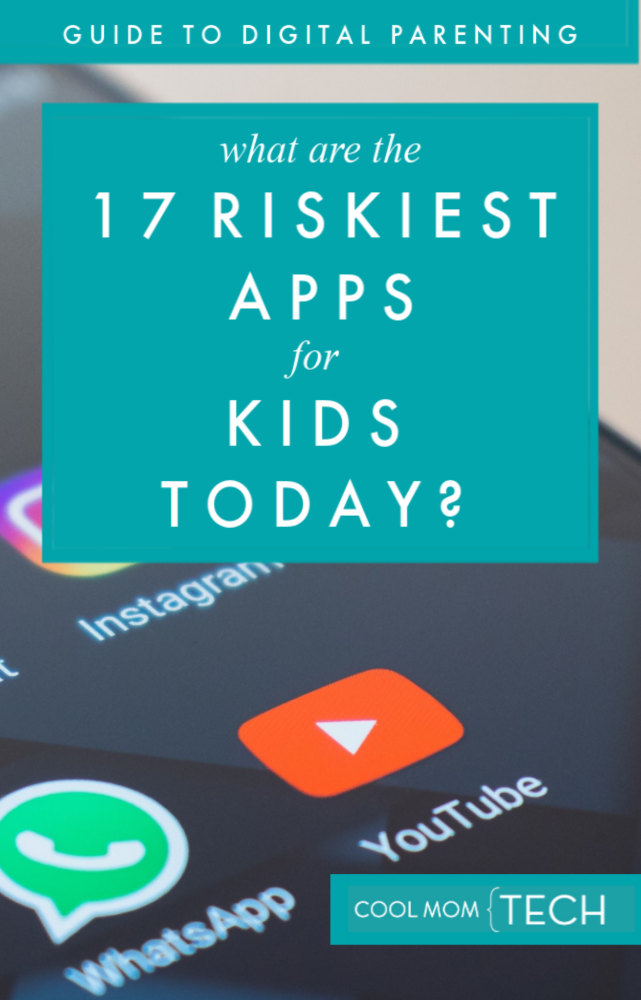
So as part of our Ultimate Guide to Digital Parenting, we thought it would be helpful to give parents the social apps worth watching out for, beyond the big networks (Instagram, Facebook, Twitter). I mean, of course you already dutifully research every single app they download (which they can’t do without your approval), right? But hey, we can all use a refresher course now and again.
In fact, we’ll be sure to keep this post updated through the year with new additions, as new, risky apps and privacy concerns hit the news. Which they will.
We’re here for you!
Risky Apps for Kids, and What You Should Watch Out For
First off, it’s important that we reiterate that these apps are not all bad. There are plenty of benefits to all kinds of websites, apps and social networks, so what’s most important is that you have the information you need to make the best decisions for your own kid.
Social media is not going away, so let’s keep that in mind before we say “no social media until you’re 47.”
Of course you do want to take into account your child’s age, maturity, and level of responsibility before saying yes or no to any given app, but it’s good to have all the info you can before making a decision. Especially when it comes to these:
YouTube – As much as we love the numerous educational, and wholesome entertainment channels on YouTube for our kids, and as much as we lock down the excellent new parental controls all we can, YouTube has problems. Even YouTube Kids is now having issues with decidedly kid-inappropriate content secretly spliced into cartoons and other all-ages video. Our best tip, particularly with younger kids, is to use those controls, hand-select your video playlists, turn off search, and for goodness sake, NEVER READ THE COMMENTS.
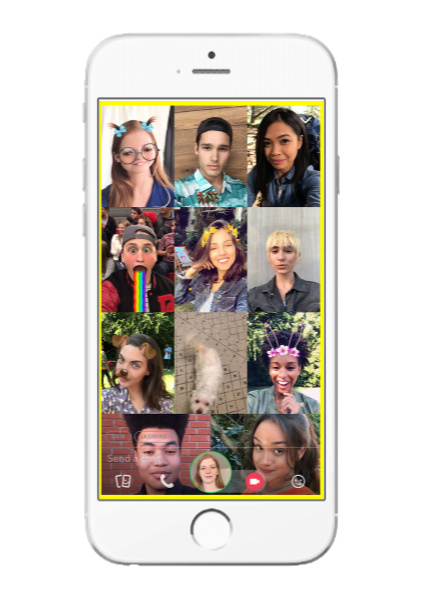
Snapchat – We’d be remiss if we didn’t mention the original “sexting” app. Yes, there are some positive things about Snapchat, and it’s become a news source and decent social media feed for millions. It even helped young people register to vote, plus wow those filters are fun! But when all of your content is designed to disappear after viewing, it’s too tempting to send risqué images or videos — or say horrible things that then get screenshot and reshared. Another concern for parents is the emphasis on selfies and body distortion and perfection, especially for our teen girls. (There’s actually a phenomenon now called Snapchat Dysmorphia which is just awful.) On the plus side, some of our kids actually describe it as “boring” and “lame” right now, so who knows, maybe its star is fading?
WhatsApp Messenger – Tons of kids — and adults — use WhatsApp especially for group chats and sharing images, audio and video and generating video calls. But it’s easily used to get around parents’ texting restrictions and prying eyes of all kinds, since you can make calls and texts that can’t be tracked. In fact you might have read a bit about the use of WhatsApp in political shenanigans, recently. P.S. Users can be sneaky! We’ve found apps that claim to let you screenshot without notifying the other user, as well as video tutorials on topics like making fake WhatsApp screenshots to fool parents into thinking you are talking about something benign if they look over your shoulders. Geez. Also know that it’s owned by Facebook, and WhatsApp shares its data, though you can opt out.
Update: Note that WhatsApp has now added more privacy controls to allow users to determine who can add them to groups. If you have a child on WhatsApp, be sure their setting is set to “Nobody,” which means they will have to manually approve every invitation.
VSCO – Parents who may still think of VSCO as a pro photo editing app — well, it still is. But as of 2019, it’s also now one of the hottest social networks for tweens and teens girls with over 20 million active weekly users. Focus seems to be on being young, skinny, rich (and white), and wearing “the right” clothes and carrying “the right” accessories — all of which are expensive. Think AirPods and $120 Fjallraven backpacks. Are we about to start a new wave of VSCO FOMO? Who knows.
Kik – This massive instant messaging app is used by about 40% of US teens, and is all about “meeting new friends” which is code for “anonymous interactions.” It’s designed for kids 13+ (or those who prey on them, and there are a lot of those based on news stories over the past few years) to send messages that are easily hidden from parents — and they can’t be traced. So law enforcement is, overall, not a fan of Kik either. It’s also been overruun by bots that are reportedly spamming accounts with sexually explicit messages. If your kids want to chat with friends, texting or even a private Instagram account are waay better bets.
Tellonym – This anonymous messenger app calls itself “the most honest place on the internet” and if that doesn’t inspire a giant eyeroll, we don’t know what will. The app is wildly popular in middle schools and high schools, allowing kids to ask and answer questions anonymously so you can imagine where that ends up. With a lot of sexual content, a lot of bullying, and even threats of violence. It can also be connected to social media accounts, so when one user writes something awful about a classmate it can be broadcast loudly to the world. Or at least, that’s what it feels like to the child being bullied.

@ericalovessyou on Tiktok. It’s actually adorable, but I wouldn’t want my 11 year old doing this.
TikTok– Formerly Musical.ly, lots of our own children’s friends as young as 10 or 11, use this app frequently. Probably because parents see it as a creative way for kids to have fun lip syncing to videos — but you should know it’s a social network with a lot of watch-outs. Kids can post publicly, share locations, and stream live. Even kids with private accounts can see all videos in the app (and the unfiltered comments), which are not entirely appropriate for all ages.
It’s got pretty limited privacy and settings as Kristen recently learned when she set up an account with her daughter. So while there’s definitely some fun stuff kids can do here, you want to spend a lot of time guiding your kids through it, or just keep it on your own smartphone for your kids to use once in a while, like Kristen does.
Whisper – While YikYak and Secret have gone down, this confessional app for teens is still used by upwards of 30 million people a month to send and receive anonymous messages and videos. As with Kik, they can get around parental texting and call restrictions since the messaging here can’t be tracked. Users are urged to chat with strangers, and because posts are shared by geographical region, that adds an additional layer of safety concern with a lot of parents. It’s filled with trolls posting racist, sexual, or abusive content, and plenty of guys asking teens for “pics plz.” Plus the app announces with pride “We use Facebook Audience Network to deliver interest based ads!” (exclamation point theirs) and there are nooooo recent issues with Facebook ads and privacy, right?
If you’ve got more digital parenting questions, don’t worry! We’ve got answers! Be sure to check out our entire Ultimate Guide to Digital Parenting.
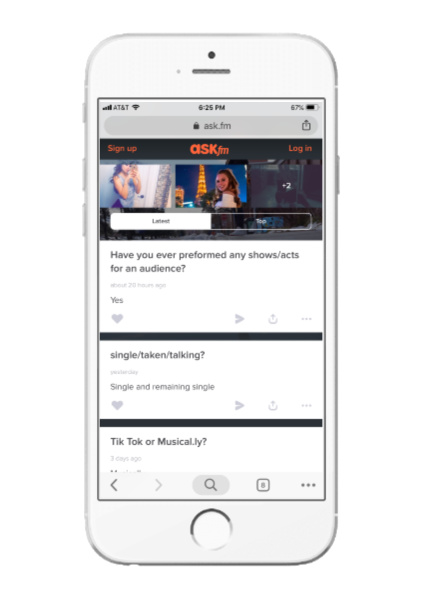
Ask.fm – This app may be best described as Twitter meets Tellonym, where tens of millions of users a day — including about 1/4 of US teens — ask anonymous questions of their networks, all unmonitored and unfiltered. Only unlike Twitter, you don’t know who is following you. You can block users, but what kind of freaks us out is that even a blocked user can continue to see your profile (including other social accounts you connect) and posts — you just won’t see their questions or likes. Ew. It’s really another app filled with cyberbullying, so much so, that UK Prime Minister David Cameron asked parents to boycott Ask.fm after cyberbullying on the app led several young teens to commit suicide. Not to be alarmist, but do our kids really need this in their lives?
Update: Ask.fm has a safety center with separate tabs for parents, teens and teachers, and a list of safety tools that’s worth checking out. Just be aware that their perspective is essentially that anonymity is good and let’s kids “be themselves” on the app, because of the “pressure” kids feel when they’re identifiable on social media. Hm.
Lipsi – This relatively new app is yet another (sigh) anonymous messaging app, only this time connected to your own Instagram account with the idea of soliciting comments about your posts under the guise of “honest feedback.” Here’s honesty for you: this is not an app advocating for “mental health,” as they suggest on their main page. Let’s keep an eye on this one.
Yubo – This social app (formerly called Yellow) is like a Tinder meets Snapchat meets location sharing meets teens and that definitely raises all kinds of red flags. In fact it’s connected to Snapchat, so that swiping to accept a friendship connects you on Snapchat so you can start sharing videos and photos with your “new friend.” Oof. By the way, it’s designed “only” for 13-17 year olds, and no one would ever join who’s over 17 and trolling or preying on kids, right? There’s no good reason for kids to have this app.
MyLOL – This app boasts that it’s the #1 teen dating app (what, we’re supposed to believe that teens have trouble meeting other teens?) with more than 300,000 members. How do we know all of those members are over 17? We don’t. How do we know they’re not 55? We don’t. Is there a ton of explicit content? Absolutely.
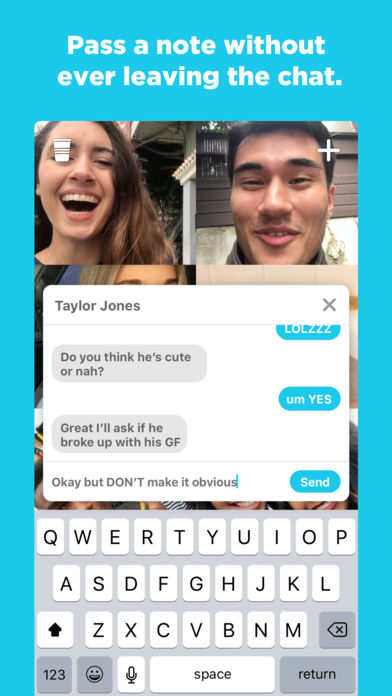
Houseparty – Haven’t heard of Houseparty? This popular group video app (it’s #15 under Social Networking in iTunes with 1 million daily uses) promises to “take group chat to the next level.” While they’ve replaced their telltale red Solo cup icon with a hand wave for a logo, that should give you a sense of the original premise of this teen-targeted app.
Features like “note passing” let kids talk about the other kids in the group video chat while it’s going on, without anyone knowing. There are also “side texts” which disappear after 24 hours. What could possibly go wrong? I’m actually surprised it’s rated 9+. However you can “lock” a chat, making it more like private Instagram video chat. So it’s not the worst app, but worth being aware of it since your kids will be live streaming and location sharing (unless they opt out).
Update: Houseparty was recently named among Fast Company’s most innovative companies of 2019, so expect to hear a lot more about this app.
AfterSchool – As with Sarahah, AfterSchool is a private social network for teens, designed for “funny anonymous news, confessions or compliments” by school, in a positive, moderated atmosphere — but take that promise with a huge grain of salt. Any anonymous app is an invitation for harassment, negativity, and cyberbullying, despite how positive and celebratory their website seems. In fact, it was shut down in 2014, though it relaunched last year. It evidently requests information about your location and school to match you with your classmates. One student review on iTunes called it “weird, sketchy, uncomfortable” and noted a lot of sexual content.
Vent – Similar to AfterSchool, this app to us is like a digital bathroom wall. We literally laughed out loud when we saw the promise of their slogan, “Express your feelings and connect with people who care.” Vent only requires an email address to register, so it’s easy to game the app and stay anonymous, even with multiple accounts. And there’s plenty of sexual content and posts about self-harm and suicide, which may be real, or may be trolling.
Spotafriend – This app is basically like Tinder for teens. Enough said? You can monitor your kid’d usage on a regular basis if you’d like but if you can’t, maybe it’s best that your kids aren’t using apps to meet with strangers in your area. There are so many ways for kids to meet other kids — join a team! Join a club! Take a class! Sheesh. Get out a little.
Tumblr – While Tumblr is really off the radars of parents as a social app, we’d be remiss if we didn’t mention it considering how often our own tweens and teens report stumbling onto it (via links to the tumblr website on their mobile browsers), even if you’re not registered. If you are registered, you can get comments and DMs from anyone at all. Basically, it’s a public platform that allows “microbloggers” to share literally anything, which means all the explicit and NSFW content you can imagine. And when you find a category like #snapchatnudes, it really makes you want to run and lock down your kids’ settings, stat.
Update: On the plus side, Tumblr recently banned all “adult” content on the platform, however it’s not an entirely foolproof AI system and is even mis-flagging clean photos. There also remain a ton of porn bots, by most accounts.
Be sure to check out all of the digital parenting questions we’ve answered as part of our Ultimate Guide to Digital Parenting.

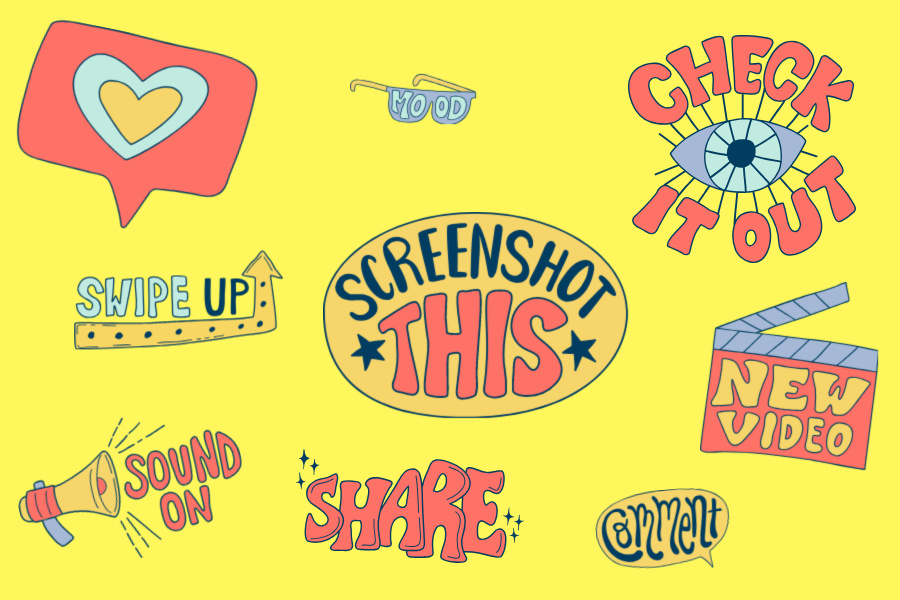
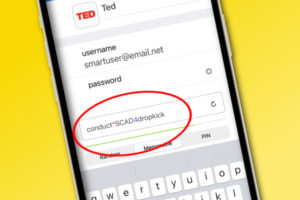



Articles like these are always so scary for a parent to read but they are also so important. It can be so easy to just turn your eyes and cross your fingers that everything your child is seeing is appropriate but the right thing to do is to be aware and to help educate our children on the risks these apps may bring. Thank you for all of this very helpful information!
Thanks for compiling this list. It’s hard to keep up with all the new apps coming out.
Good morning…just wanted to let you know I have referenced this article in 10 national radio interviews this morning. Thanks for the great work. The shows were dealing with GPS spoofing and I included a reference to this article so parents could be informed.
Thanks Chuck, that’s fantastic! We appreciate your support, and really hope it helps out more parents.
Umn not trying to be rude or anything but lmao im a teen and most of the stuff you said on here is either not true or highly over exaggerated. i mean ive had my fair share of dodgy apps/websites but nothing really happening and if something happens most teens will prob block, report or get off/delete the app or website. did you even do research into any of this ask any teens most of them prob dont know what any of these apps/websites are to be honest with ya. with spotafriend which ive been on has actually alot of great people and no one actually asks if you wanna meet up and same with mylol. again not trying to be rude just saying.
—
Thanks Bethany! Not rude at all. You sound like a great kid with a good sense of safety. But…we still have to be the parents, and look out for some kids who don’t have the boundaries you do.
Tell your parents they did a good job with you. – Eds
thankyou
Thanks for spreading the word about these dangerous apps! Every parent must know about the digital world in which our kids are growing up. I appreciate the balanced approach: underscoring the importance of open communication and teaching good digital citizenship. Awesome resource on how to keep our kids safe online!